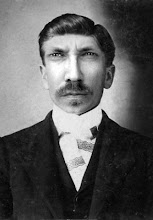 At one time, I basically thought that if my first movie was ever seen, and people appreciated it, I would stop hearing all the things you need, everything you "must have", before you can make one. I didn't understand how anyone would be able to appreciate what we'd done--with practically nothing, with a crew of three, with no gear, no lighting, no catering, no budget--and persist in that line of thought.
At one time, I basically thought that if my first movie was ever seen, and people appreciated it, I would stop hearing all the things you need, everything you "must have", before you can make one. I didn't understand how anyone would be able to appreciate what we'd done--with practically nothing, with a crew of three, with no gear, no lighting, no catering, no budget--and persist in that line of thought.Stupidly, I'd imagined never having to deal with that kind of thinking again, having disproved it. So I was pretty surprised at my first festival, where The Way I See Things was spotlighted as a sort of singular accomplishment, and I heard so many directors talking about the Sisyphean struggle they'd had with their very limited budgets of 200, 000 or 500,000--for seven to twenty minute films.
Making the movie, I was determined to keep things simple and flexible. As much as possible, I wanted to create that environment Lynda Barry talks about, that really pure place for creative exploration. All the gear and the people running around and into each other on movie sets seemed so extraneous to me.
How could you be vulnerable, how could you concentrate, with so many strangers ogling at you? When I worked on Forty Shades of Blue in the prop department and I was needed on set, I was instructed not to look the actors in the eye. But it seemed so silly to me. Why should we all have been there in the first place? So a glass needed refilling between scenes; so a lemon needed to be extracted from the glass so that someone in the scene could again squeeze a fresh one. So lights needed to be adjusted or sound needed to be monitored and faces needed to be powdered. That was understandable, given the scale of the production. But why not scale it down?
All of those technical intrusions force the mind into distracting little dead end alleys, and after a while it's hard to get back on track. Why not have your friend hold the boom? An actor can powder his own face. Get all the people off set and you'll hear the sound better, because fewer people will be chattering and it will take no one to keep reminding them to be quiet. Find a setting where you can use natural light. Why do you need a lemon, exactly?
Suggestions like this are heresy among people who consider themselves filmmakers. An image exists in the mind of the auteur and that image has to be cultivated, whatever the obstacle. Anything less is regarded as near to total artistic compromise, as if compromise were the sign of deficient vision.
One of things I enjoyed most was finding places we could walk into and use with very little embellishment, fantasy worlds we could hijack and play-act in. I built the story around those places, rather than look for places which fit some specific, preconceived idea. When we walked into these places they imposed various considerations, presenting us with individual obstacles.
The compromises were liberating because we weren't beholden and could rethink and stay in whatever moment we were inhabiting, responding genuinely to genuinely surprising prompts and challenges, thinking in that moment instead of outside it. Each place determined the tone and direction of the scene at hand in ways which created a strangely compelling sense of authenticity.
This m.o. requires spontaneity and intuition, and I understand how nerve-wracking and fear-inducing those things can be. I spent my own money making The Way I See Things, and I don't have a lot of money to throw around. I understood better than anyone else on set what was at stake and the weight each decision carried. But who better to take those risks?
That's why to some extent the filmmaking process is inherently fucked. You go to other people for money and they want to know what their money is buying them. They want to know they'll get what they're paying for. If they paid for a love story that's what they want. It doesn't matter if a weird chemistry develops between the actors playing the lovers which, if explored, might go in more interesting directions. It doesn't matter what kind of beautiful serendipity might occur on set if you allow it to. If it isn't in the script they approved, it won't happen. Everyone agreed it wouldn't.
That's fine. A movie should have a subject. But there's a lot of room for discovery within any given subject and most of those vistas don't open up until you get to the set and face your limitations. Seizing those limitations as opportunities is a pretty wondrous thing, a specialized kind of high. It keeps the mind working. 300, 000 is so irrelevant in that context. Thinking you need it, then relinquishing that sense of need is totally freeing.
Maya Deren talked about the mindset I experienced at that film festival. If you listen to everything you'll need you'll never make the film, she essentially said. There is no perfect time or place, and the canvas is always wet. You need nothing but a camera. If you think you need tons of money and you don't have it and therefore believe you can't move ahead, what you really don't have enough of is imagination.




No comments:
Post a Comment